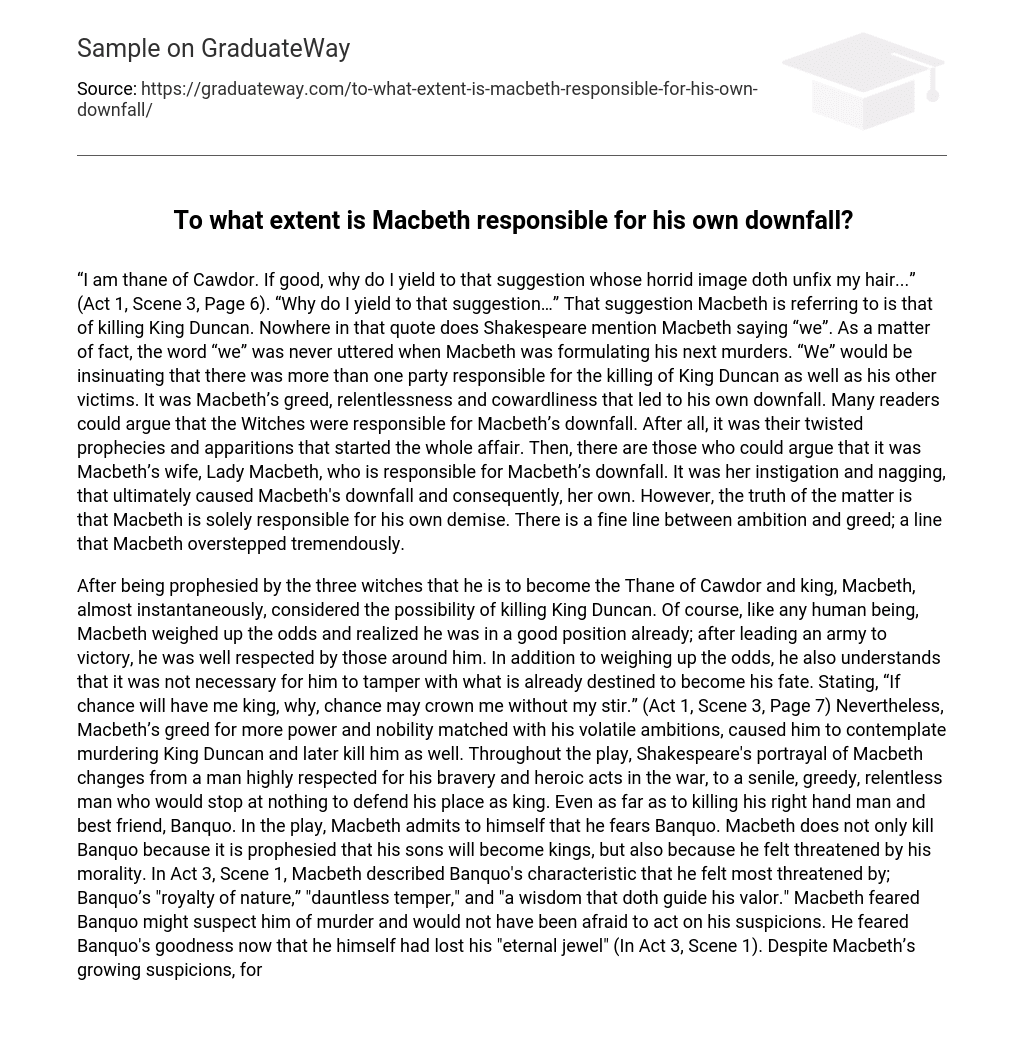“I am thane of Cawdor. If good, why do I yield to that suggestion whose horrid image doth unfix my hair…” (Act 1, Scene 3, Page 6). “Why do I yield to that suggestion…” That suggestion Macbeth is referring to is that of killing King Duncan. Nowhere in that quote does Shakespeare mention Macbeth saying “we”. As a matter of fact, the word “we” was never uttered when Macbeth was formulating his next murders. “We” would be insinuating that there was more than one party responsible for the killing of King Duncan as well as his other victims. It was Macbeth’s greed, relentlessness and cowardliness that led to his own downfall. Many readers could argue that the Witches were responsible for Macbeth’s downfall. After all, it was their twisted prophecies and apparitions that started the whole affair. Then, there are those who could argue that it was Macbeth’s wife, Lady Macbeth, who is responsible for Macbeth’s downfall. It was her instigation and nagging, that ultimately caused Macbeth’s downfall and consequently, her own. However, the truth of the matter is that Macbeth is solely responsible for his own demise. There is a fine line between ambition and greed; a line that Macbeth overstepped tremendously.
After being prophesied by the three witches that he is to become the Thane of Cawdor and king, Macbeth, almost instantaneously, considered the possibility of killing King Duncan. Of course, like any human being, Macbeth weighed up the odds and realized he was in a good position already; after leading an army to victory, he was well respected by those around him. In addition to weighing up the odds, he also understands that it was not necessary for him to tamper with what is already destined to become his fate. Stating, “If chance will have me king, why, chance may crown me without my stir.” (Act 1, Scene 3, Page 7) Nevertheless, Macbeth’s greed for more power and nobility matched with his volatile ambitions, caused him to contemplate murdering King Duncan and later kill him as well. Throughout the play, Shakespeare’s portrayal of Macbeth changes from a man highly respected for his bravery and heroic acts in the war, to a senile, greedy, relentless man who would stop at nothing to defend his place as king. Even as far as to killing his right hand man and best friend, Banquo. In the play, Macbeth admits to himself that he fears Banquo. Macbeth does not only kill Banquo because it is prophesied that his sons will become kings, but also because he felt threatened by his morality. In Act 3, Scene 1, Macbeth described Banquo’s characteristic that he felt most threatened by; Banquo’s “royalty of nature,” “dauntless temper,” and “a wisdom that doth guide his valor.” Macbeth feared Banquo might suspect him of murder and would not have been afraid to act on his suspicions. He feared Banquo’s goodness now that he himself had lost his “eternal jewel” (In Act 3, Scene 1). Despite Macbeth’s growing suspicions, for him to kill Banquo, his best friend, shows his relentless nature when his crown is in peril. As previously stated before, Macbeth was fully aware that he had no reason to commit any crimes in relation to becoming king because he was destined to become it.
In a time were supernatural occurrences and destiny was presumed to be true, Macbeth had no real reason to murder King Duncan. Macduff had some suspicions over the death of King Duncan and thought that Macbeth had some responsibility toward his death. Macbeth thought that he would be an obstacle and stepping stone towards his success so he decided to kill Macduff’s family demonstrating his power and keep his crown. In Act 4, Scene 2, Macduff’s son says in agony, “He has killed me, mother. Run away, I pray you!”. His senseless slaughter of Macduff’s family proved just how terrible and horrifying his true character is as well as how cowardly he has become. After reading the play, Macbeth, one can understand w hy some may continue to argue that without the witches and Lady Macbeth, Macbeth would have never committed any of the murders. However, Macbeth can only take responsibility for his own actions. And it was his own character and actions that ultimately led to his demise. A hero turned tragic hero is what Shakespeare wanted to portray in his play. With that said, Macbeth had resolved himself into a stereotypical villain and his ambition of keeping the crown transformed himself into a greedy, relentless, cold-blooded monster and downgraded himself into a lowly coward.





